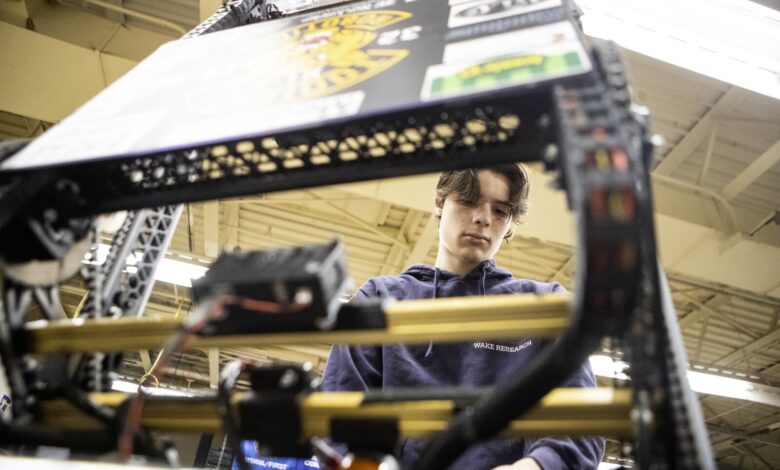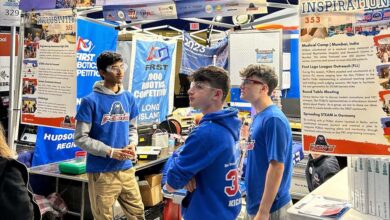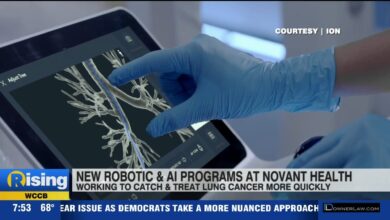New London-Spicer Toolcats engineer a successful season of robotics competitions – West Central Tribune

— Robotics as a field is becoming more and more prevalent in everyday life. From self-driving cars to robotic vacuum cleaners, robots have found a place in society.
What these machines are capable of has expanded quite a bit in the past few decades, and the next generation of robots are sure to do even more.
In order to help teach future programmers and engineers, many schools have joined in on the FIRST robotics program, a nationwide organization which has students design and build robots to fulfill tasks in a competitive environment.
Students who are members of the New London-Spicer High School’s FIRST robotics team, named the Toolcats, found success in competitive environments throughout the season. After placing first at two regional tournaments, the team qualified for the World Championship in Houston, Texas, where they placed seventh overall in their district.
Macy Moore / West Central Tribune
After returning home from worlds, the team took on the Minnesota State High School League’s state level tournament where they took second.
“The overall scale of our success is something that our school hasn’t ever seen before, so it definitely is a big deal. Everyone in the district is super invested in our program,” robotics student Victoria DeBernardis said in an email.
The team is made up of 21 members who are all part of a robotics class at NLS High School. The robotics program has been ongoing at the school since 2010.
“A program like FIRST Robotics cultivates a team-building environment that inspires skills in programming, computer-aided design, strategic planning, marketing, fundraising, fabrication, and the STEAM disciplines related to robotics,” robotics adviser and industrial technology instructor Aric Harrier said in an email.
The NLS Educational Foundation specifically sets aside grant monies to fund STEAM — or science, technology, engineering, arts and math — projects, including 3D printers that are used by students on the robotics team, according to the foundation’s web page.
“When students catch ‘robot fever,’ they become inspired and curious about their contributions to the team,” Harrier continued. “At this stage, they become self-learners, and my role is to support and provide them with the resources they need.”

Macy Moore / West Central Tribune
FIRST Robotics competitions began in Minnesota in the 1990s. By the mid 2000s, the state hosted only two teams, though the program took off across the state in 2006 when Medtronic, Boston Scientific and other technology-driven businesses began sponsoring Minnesota teams. By 2020, there were 224 teams in Minnesota, according to the
FIRST Robotics Competition of Minnesota and the Dakota’s website.

Macy Moore / West Central Tribune
Teams compete by building and programming a robot that is designed to fulfill tasks determined by FIRST competition facilitators. The tasks change each year, meaning teams have to stay on their toes to create new robots each year.
This year, the robots took on the Crescendo challenge. In this challenge, robots in teams of three had to collect hoops from a playing field and deposit them into various receptacles. Teams scored more points for the number of hoops recovered.
Teams that find success are able to recruit other teams to form alliances. This lets teams strategically choose other robots that complement the strengths and weaknesses of their robot.
“We were a little disappointed with our experience at Worlds, as we believe we could’ve gotten a lot further in the competition. Our bot, Piccolo, was working flawlessly,” DeBernardis said, but their alliance captain’s robot had a technical foul and broke during the first playoff match, immediately putting the Toolcats’ alliance in the lower bracket.
“We then played one of our best matches ever but were still unable to beat the opposing alliance,” DeBernardis said.

Macy Moore / West Central Tribune
With a successful season under its belt, the Toolcats have the entire school watching. During competitions, teachers would bring TVs into classrooms to let students watch.
“While we’re at our competitions, teachers often play our live-streamed matches on their computers and projectors. We’re just so overwhelmed and thankful for everyone’s support. It truly means a lot,” DeBernardis said.
Levi Jones is the West Central Tribune’s business reporter. After growing up in the Twin Cities, Jones attended Hamline University for journalism and media communications. After graduating in 2020, Jones has worked as a reporter covering anything from sports to politics.




